

Reverse email lookup has become an invaluable technique for businesses and investigators to uncover the person or organization behind an email address. In simple terms, a reverse email lookup means starting with an email and finding information about its owner. This could reveal the person’s name, social media profiles, contact details, and other digital footprint elements tied to that email. Over the years, the technology has evolved from manual Googling and checking social networks into sophisticated platforms that aggregate data from countless sources in real time. Today’s tools can instantly scan open web databases, social sites, public records, and more to build a profile from just an email address.
Understanding Reverse Email Lookup Technology
Modern reverse email lookup tools act as powerful people search engines that transform a single data point (an email) into actionable intelligence. Under the hood, these tools use a mix of methods: some query massive identity databases, others perform live searches across the web (OSINT techniques), and many combine both approaches. Early services relied on static databases of public records or leaked email lists, but newer solutions emphasize real-time enrichment – fetching fresh data whenever you perform a lookup. This development addresses a key issue with older lookup technologies: data freshness. For example, depending solely on cached databases can lead to outdated info (e.g. someone’s former job or old usernames), whereas live lookup fetches current public information from websites and social platforms.
Common methods employed include:
- Social media & online profile search: Scanning social networks, forums, and websites to find accounts associated with the email. Many people reuse the same email for LinkedIn, Facebook, Twitter, etc., making it possible to find multiple profiles. Advanced tools even check niche sites (from messaging apps to gaming or fitness platforms) to assemble a comprehensive digital footprint.
- Public records and people databases: Utilizing people search engines and background check databases that compile information like names, addresses, phone numbers, and criminal records linked to an email. This is common for services oriented toward background checks.
- Email verification and domain analysis: An often-overlooked aspect is technical email verification – i.e. checking if the email address is valid and active. Many lookup tools will verify if an address can receive mail and analyze the email’s domain (is it a free provider or a custom domain? does the domain have a good reputation, or is it flagged as disposable/spam?). This helps separate throwaway emails from legitimate ones.
- Data breach and OSINT databases: Some services cross-reference the email against data breach repositories or OSINT data to see if it appears in known leaked datasets (e.g. indicating where the email was used).
Performing these searches manually is extremely time-consuming. While one could manually use search engines or scour social media, dedicated reverse email lookup tools are far more efficient – they aggregate hundreds of sources in seconds. This makes them indispensable in scenarios like fraud prevention, marketing, and investigations where quick insights are needed.
Business Use Cases and Benefits
Originally a handy trick for curious individuals, reverse email lookup is now a staple in many B2B workflows. Companies use it for fraud detection and risk analysis, marketing lead enrichment, and background checks on users or clients. For example, in fraud prevention, looking up an email can reveal if a new user has an established digital footprint or not – emails with no presence or those tied to many sketchy sites might signal a fake or high-risk user. Marketing and sales teams use email lookup to enrich leads (turn a list of email addresses into full profiles with names, job titles, company info, etc.), improving outreach success rates and avoiding dead ends. Recruiters and compliance teams perform reverse email searches as a lightweight pre-screening, which can flag discrepancies in a candidate’s or customer’s provided information before full KYC or onboarding.
When choosing a reverse email lookup solution, businesses consider factors like data depth (basic contact info vs. detailed social/digital footprint), coverage (global vs. regional data), compliance (GDPR, CCPA, etc.), and integration (availability of APIs or bulk lookup for scaling). The following sections review 10 leading reverse email lookup tools available today. We’ll describe each product, its key features, typical use cases, and how it stands out. Finally, we’ll compare them side-by-side and draw conclusions on which might fit best for different needs.
1. Scoreplex – Reverse Email Lookup & Digital Footprint Analysis
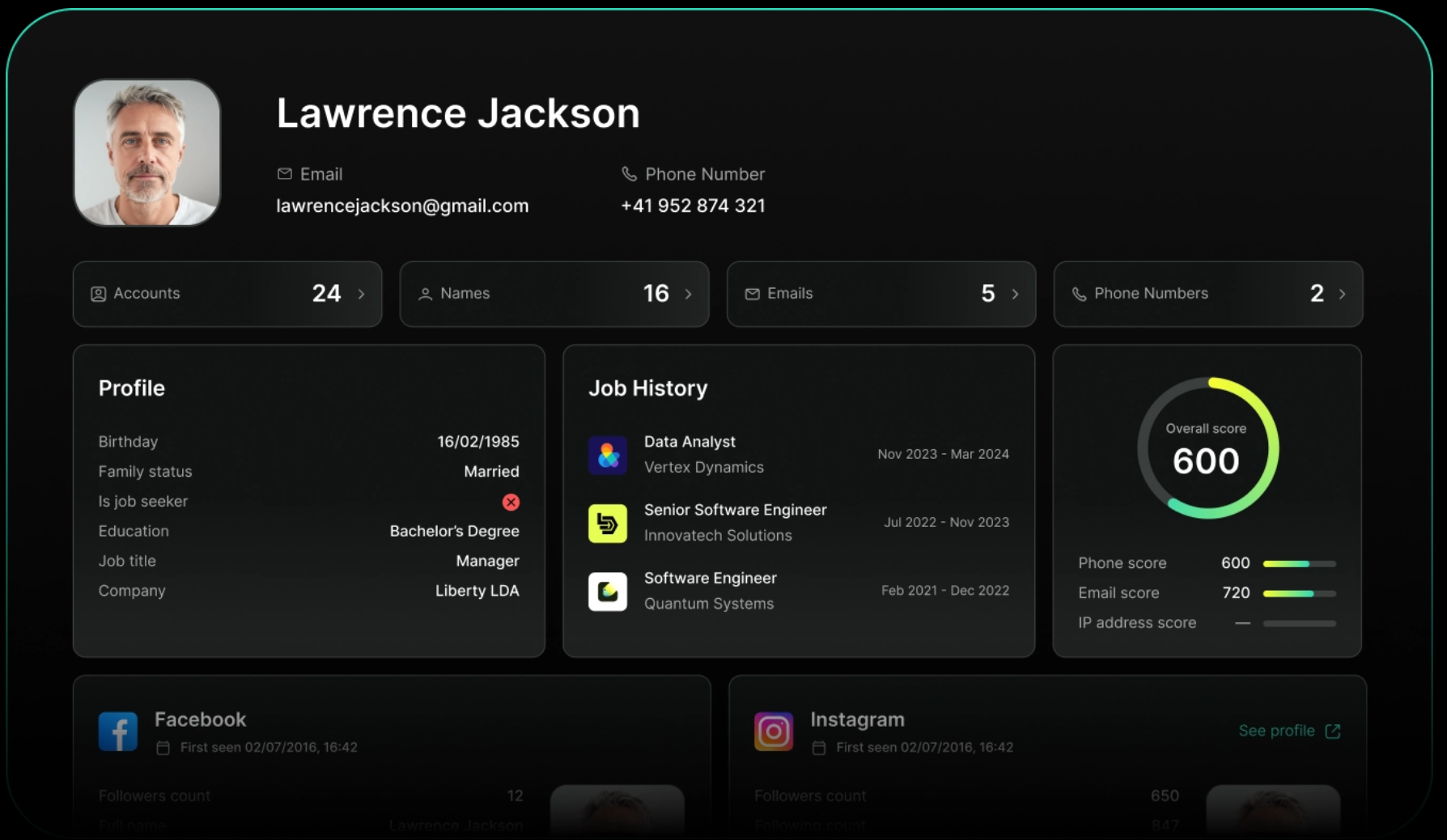
What it is: Scoreplex detects fake accounts and synthetic identities by leveraging AI-driven digital footprint analysis to assess risk and verify identities in real time. The platform integrates cutting-edge algorithms and machine learning models to provide real-time verification of accounts based on various data points.
Coverage & sources:
- Aggregates data from 300+ global sources: social media, messaging platforms, apps, and breach databases.
- Broad international coverage.
Core capabilities:
- Email intelligence: Contact details, education/work history, social media profiles, photos/avatars, interests, approximate location.
- Hidden connections: Maps associated emails, phone numbers, and linked accounts across niche platforms.
- Technical checks: Validity and reputation scoring, domain analysis (age, DNS, provider), email string pattern recognition.
- Cross-validation: Matches email with name and phone numbers when available to confirm identity consistency.
- Breach & activity monitoring: Flags if emails appear in data breaches; analyzes social activity for authenticity signals.
- Delivery modes: Real-time API or dashboard.
Strengths:
- Holistic view: Combines footprint mapping with technical email intelligence.
- Real-time analysis: Results delivered instantly, suitable for live decision-making.
- Global scale: Not limited to U.S. data; scans a wide range of international sources.
- Flexible applications: Works equally for risk review, research, and data enrichment.
Primary use cases:
- Online presence analysis: Scoreplex examines an account’s online presence and activity patterns across digital platforms. Suspicious behaviors—such as newly created accounts, abnormal engagement bursts, or isolated networks—are flagged with precision.
- Digital onboarding: Enrich customer profiles during signup with detailed background info.
- Data enrichment & analytics: Convert a raw email into a full profile for CRM, personalization, or segmentation.
Limitations to note:
- As a newer entrant, it is still building market recognition compared to legacy providers.
- Depth and breadth are strong, but best leveraged alongside traditional KYC tools in regulated workflows.
Best fit: Organizations looking for modern, AI-driven digital footprint analysis with global coverage. Ideal for fintechs, platforms, and research teams that want to turn an email into a rich, real-time identity profile for verification, enrichment, or onboarding.
2. Pipl – Identity Resolution and Data Enrichment
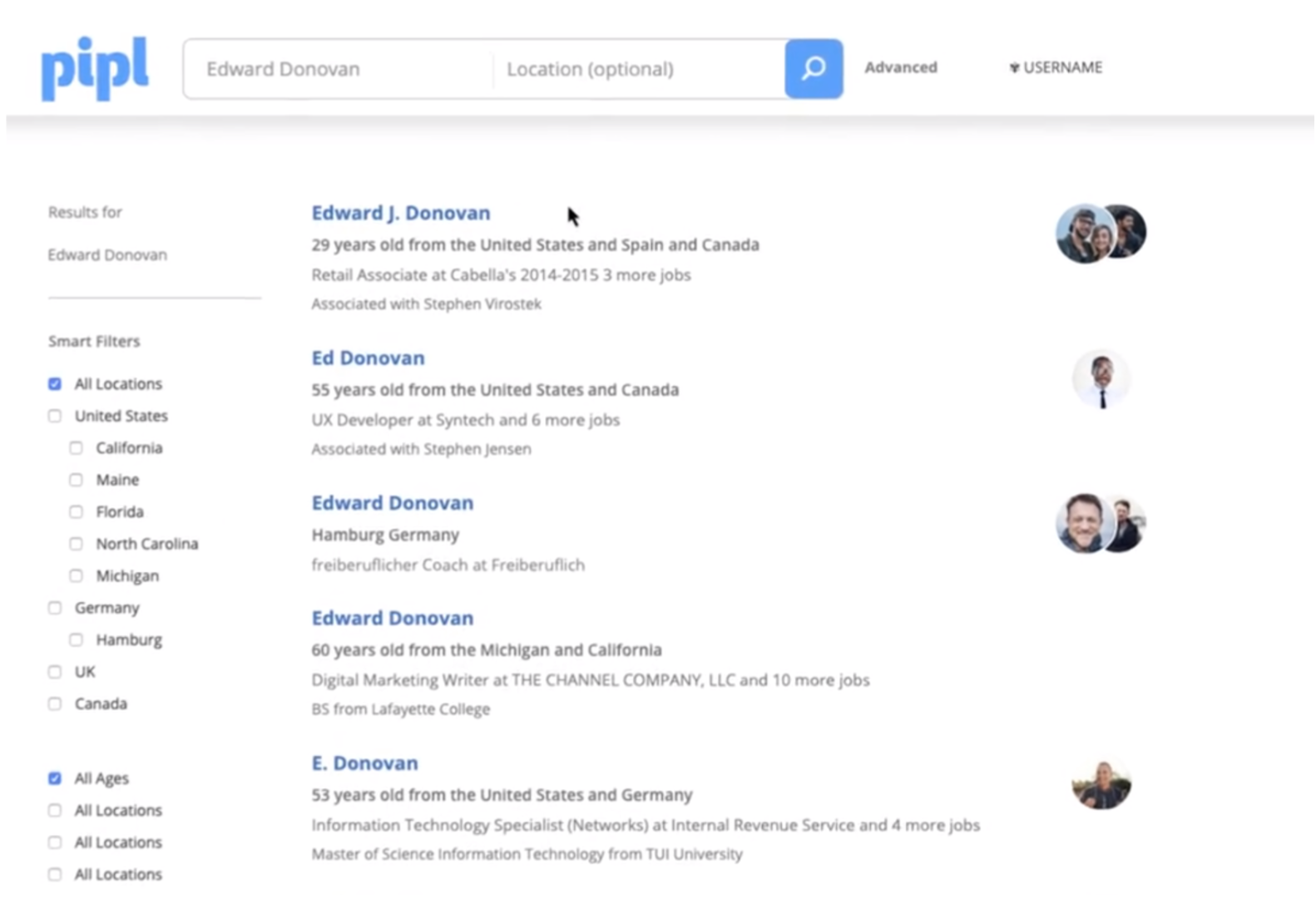
What it is: A U.S.-based identity platform widely used for reverse email lookup and people search in professional and investigative contexts. Known for its vast, global database.
Coverage & sources:
- 5B+ identity records across 150+ countries.
- Data from public records, directories, social media, and other open sources.
Core capabilities:
- Email/phone/social lookup: Returns name, age, addresses, phone numbers, social accounts, employment, relatives/associates.
- Pipl SEARCH: Manual lookup tool used by analysts, investigators, and agencies.
- Pipl API: Automates data enrichment workflows for businesses.
- Identity trust building: Connects fragments of digital presence (jobs, social profiles, public records) into unified profiles.
Strengths:
- Global scale: One of the broadest international datasets available.
- Deep profile building: Combines personal, professional, and social details.
- Flexible use: Suitable for manual research, investigations, and automated enrichment.
Primary use cases:
- Data enrichment: Add context to customer databases and sign-up forms.
- Professional research: Build dossiers with biographical and career history.
- Investigations & journalism: Connect identities across sources to verify claims or uncover relationships.
- Legal & compliance: Check consistency of personal details for regulatory or due diligence needs.
Limitations to note:
- Data freshness: Records can be outdated (e.g., past jobs or names not yet updated).
- Manual bias: Built primarily for research and review, not real-time automation.
- Interpretation needed: Results often require human analysis to confirm accuracy.
Best fit: Organizations and professionals needing comprehensive identity profiles and global coverage. Especially valuable for research, compliance, and background checks where depth of detail matters more than instant automation.
3. Spokeo – People Search Engine for Contact & Social Info
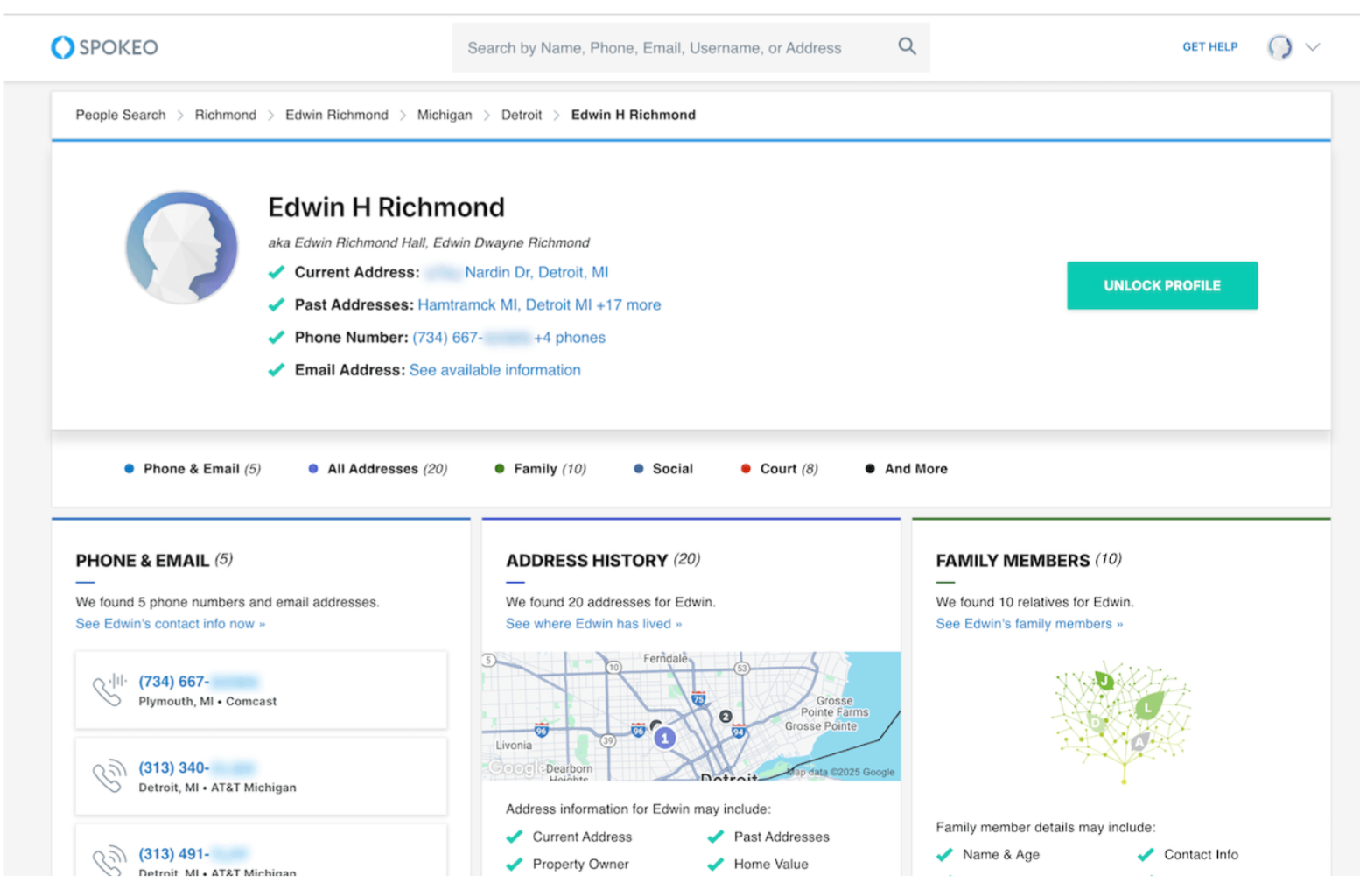
What it is: A U.S.-based people search platform with a consumer-friendly interface and long-standing reputation. It compiles public records and online data into searchable reports.
Coverage & sources:
- 12B+ records including names, addresses, phone numbers, emails, social profiles.
- Sources: phone directories, property/real estate listings, court records, social networks, and marketing aggregators.
- Primarily U.S.-focused, with limited global depth.
Core capabilities:
- Email lookup: Provides name, location, demographics, and linked social profiles.
- People reports: Consolidates contact info, addresses, and public records.
- Enterprise features: Bulk search & API for lead enrichment, verification, or research.
Strengths:
- Quick & simple results: Reports generated in seconds.
- Broad consumer appeal: Used by 18M+ monthly visitors.
- Accessible reports: Consolidates contact info and online presence in one place.
- Popular starting point: Handy for basic checks or enrichment.
Primary use cases:
- Personal: Identify unknown senders, reconnect with old contacts, dating vetting.
- Small business: Add contact info to customer lists, run simple background checks.
- Research/journalism: Collect easily accessible public information.
Limitations to note:
- Shallow insights: Focused on surface-level contact and social data; lacks advanced analysis.
- U.S.-centric: Sparse results for non-U.S. users.
- Data freshness: May lag behind specialized OSINT or investigative platforms.
Best fit: A lightweight, all-purpose tool for individuals or SMBs needing quick background info and social/contact enrichment — best used as a starting point before moving to more advanced investigative solutions.
4. BeenVerified – Background Checks and Personal Profiles (US-Focused)
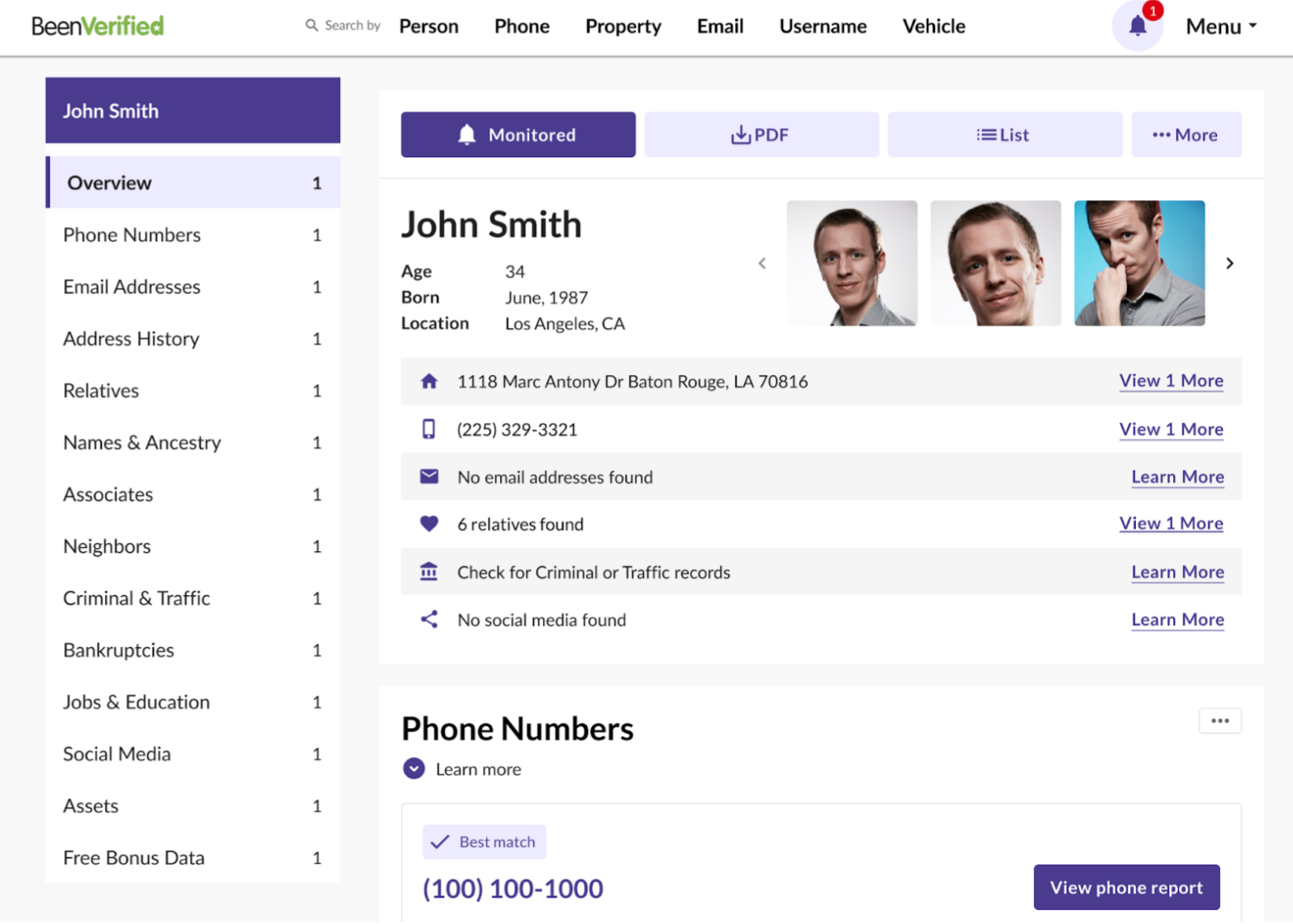
What it is: A U.S.-based people search and background check service that compiles public records and digital traces into easy-to-read reports, accessible via website and mobile apps.
Coverage & sources:
- Billions of records from court databases, property filings, corporate registries, social networks, directories, and marketing aggregators.
- Focused mainly on the U.S. market.
Core capabilities:
- Email lookup: Returns name, phone numbers, addresses, social accounts, relatives, aliases, and usernames.
- Background reporting: Includes available criminal history, bankruptcies, liens, and property ownership.
- Cross-referencing: Links identifiers across different public sources (e.g., same email tied to court filings).
- Other tools: Reverse phone search (via NumberGuru), people search by name, address lookups.
Strengths:
- Mobile accessibility: Dedicated iOS/Android apps for quick lookups anytime.
- Comprehensive reports: Combines identity, demographic, and public record info in one place.
- Consumer-friendly: Popular with individuals and small businesses.
- Noted for strong coverage of U.S. data compared to some competitors.
Primary use cases:
- Personal: Reconnecting with old friends, verifying online acquaintances, or learning more about someone new.
- Small business: Checking potential customers, partners, or contractors before engaging.
- Landlords: Screening prospective tenants for stability and background.
- Research & journalism: Gathering accessible public details for stories or investigations.
Limitations to note:
- U.S.-centric: Results for international users are limited.
- Data variability: Depends heavily on availability of public records.
- Subscription requirement: Full reports are behind a paywall; limited free data.
- Not investigative-depth: More of a broad overview than a deep OSINT resource.
Best fit: Individuals or small organizations seeking a practical, consumer-friendly tool for quick background checks, reconnecting, or enriching contact details — especially in the U.S. context.
5. PeopleFinder – Public Records Search for Background Information
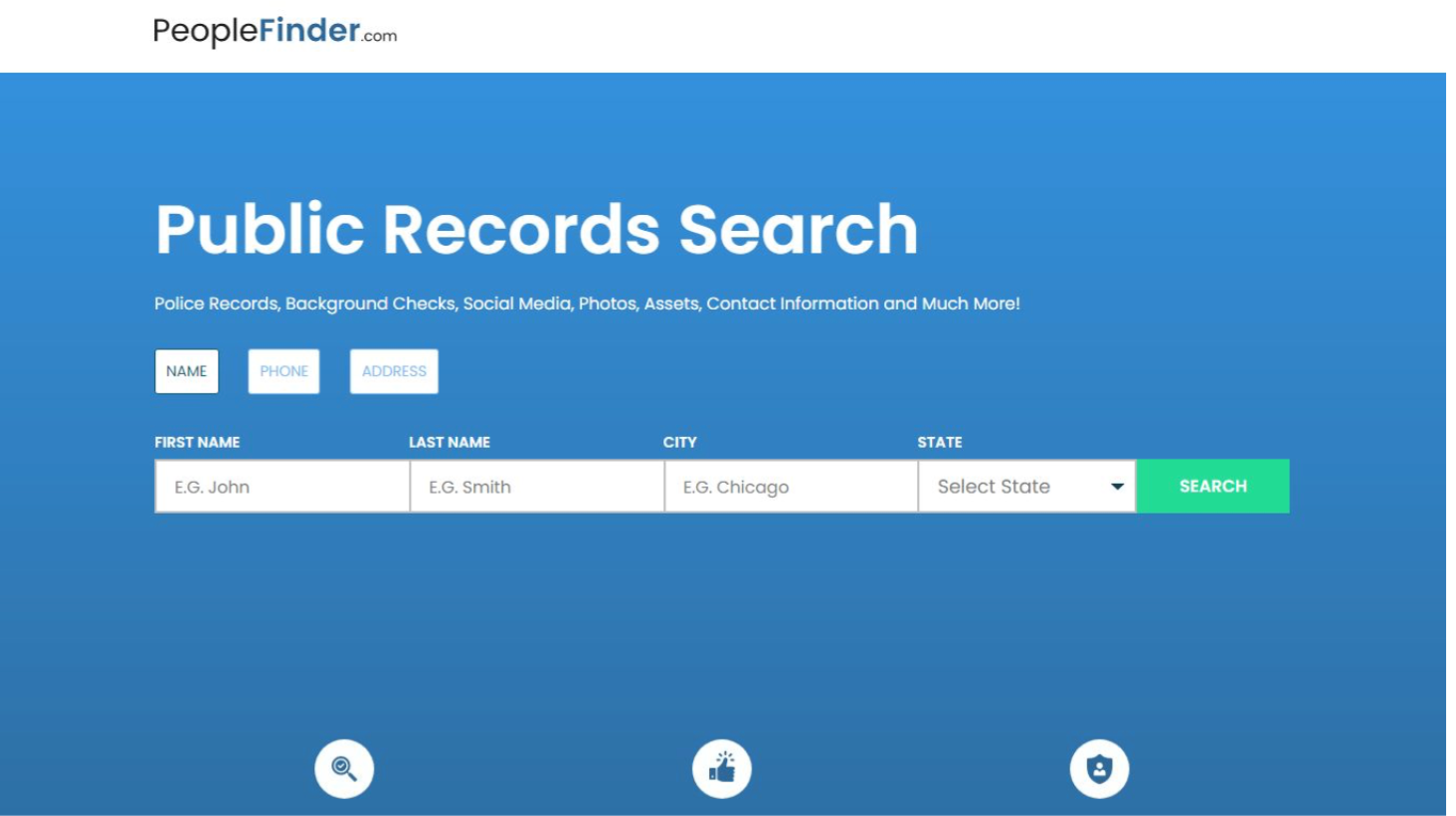
What it is: One of the older players in the people search industry, PeopleFinder offers reverse email lookup as part of a suite of background check and public record tools.
Coverage & sources:
- Searches billions of records from thousands of public data sources.
- Strong coverage of criminal, arrest, marriage/divorce, property, and court records.
- Primarily U.S.-centric focus.
Core capabilities:
- Reverse email lookup: Name, phone numbers, addresses, and public records linked to the email.
- Background checks: Detailed criminal history, address history, and property records.
- Social connections: Sometimes returns social media accounts or related online presence.
- Other lookups: People search by name, phone, or address.
Strengths:
- Public record depth: Strong access to U.S. legal, property, and identity-related records.
- Background context: Goes beyond contact info to provide legal and historical details.
- Widely used: Popular for small businesses, HR, landlords, and independent investigators.
Primary use cases:
- Due diligence: Vetting partners, tenants, or employees with full record checks.
- Investigations: Gathering background context on individuals beyond just contact info.
- Personal: Finding long-lost contacts or verifying unknown ones.
- Small business: Screening suspicious buyers, sellers, or applicants.
Limitations to note:
- Email-specific searches weaker: Not always as strong as Spokeo or BeenVerified for social/digital traces.
- Hit-or-miss results: May fail to return matches competitors find.
- U.S.-focused: Limited utility for international lookups.
Best fit: A solid choice if your priority is comprehensive background checks via public records. Less effective as a pure reverse email lookup for social profiles or digital footprints, but very strong for legal and historical context around a person.
6. Social Catfish – Verify Online Identities (Email, Phone, Images)
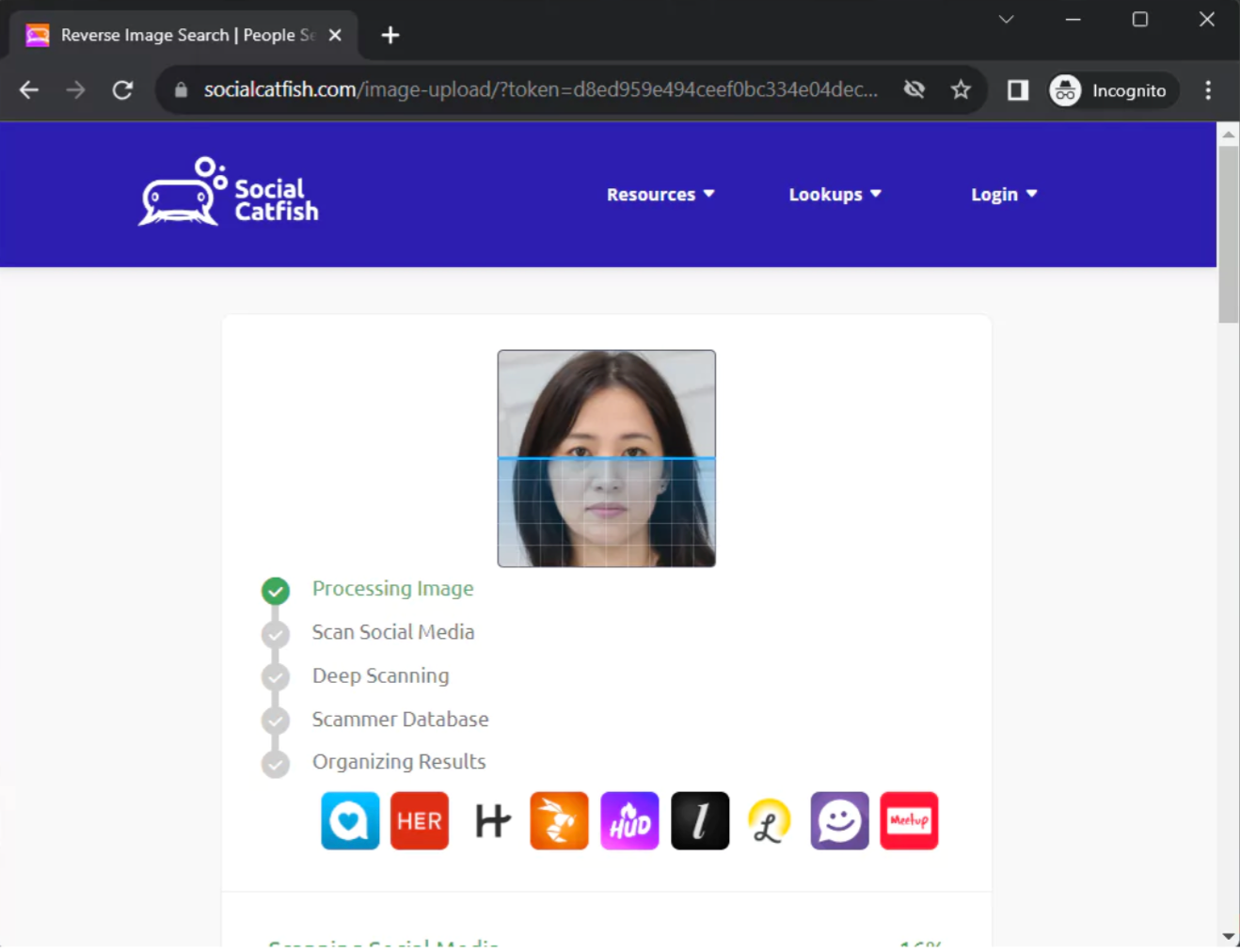
What it is: A U.S.-based investigation service originally known for reverse image searches to catch online dating scammers. It now supports reverse lookups by email, phone, name, username, and address to uncover linked accounts and digital identities.
Coverage & sources:
- Scans social networks, dating sites, public directories, and online photos.
- Uses face recognition and image metadata to find stolen/reused images.
- Attempts global searches where public data is available.
Core capabilities:
- Reverse email lookup: Finds accounts, dating profiles, social profiles, aliases, and online records tied to an email.
- Image-based search: Identifies stolen or reused images across platforms.
- Cross-platform investigation: Links identities across niche and mainstream platforms.
- Reports: Includes known relatives, aliases, social links, and online presence.
Strengths:
- Unique focus: Designed to detect “catfishing” and online romance scams.
- Broader reach than Google: Uses proprietary search methods to uncover hidden or reused digital assets.
- Multi-modal: Combines email, phone, name, username, and image searches.
- Reputation: Used by individuals, dating platforms, and investigative professionals.
Primary use cases:
- Personal safety: Verifying online dating connections or social contacts.
- Businesses & platforms: Screening new signups for fake profiles or stolen images.
- Investigations: Law enforcement and private investigators mapping online identities.
- Employment checks: Informally validating candidates’ digital presence (with compliance caveats).
Limitations to note:
- Paid model: Detailed results require a membership or report purchase.
- Manual review needed: Results often need interpretation to confirm accuracy.
- Consumer-first orientation: Strong for individuals and niche business use, but less API-driven than enterprise data platforms.
Best fit: A strong choice for validating online identities and uncovering inconsistencies across social and dating platforms. Ideal for individual users, dating sites, and marketplaces seeking to boost trust and safety.
7. ClarityCheck — Consumer Reverse Email & Identity Lookup
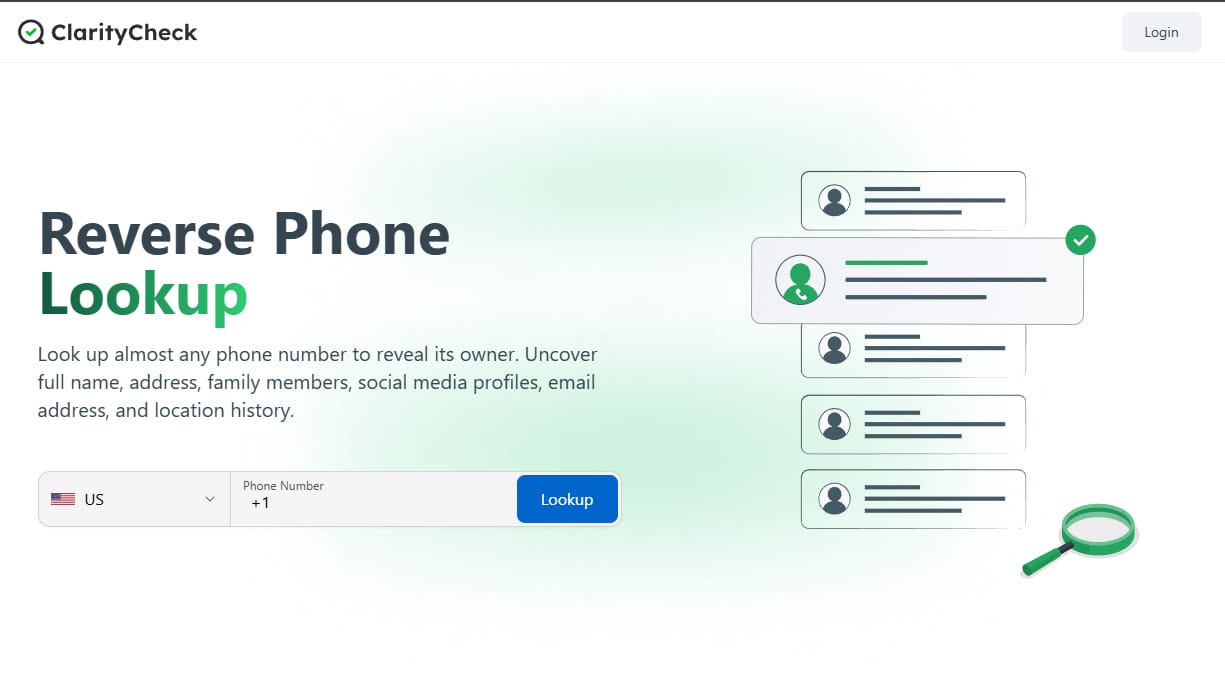
What it is: A consumer-focused reverse email lookup tool that helps uncover identity details behind an email address, aimed at everyday users rather than enterprise investigations.
Coverage & sources:
- Pulls from public records, online directories, and social media platforms.
- Focused on quick-turnaround checks for personal use cases.
Core capabilities:
- Email lookup: Returns potential names, addresses, family members, social media links, and associated accounts.
- Multi-format search: Supports reverse lookups by email, phone number, or image.
- Digital footprint scans: Surfaces linked profiles or past web activity tied to the identifier.
Strengths:
- Easy-to-use interface: Accessible for non-technical users.
- Broad utility: Helpful for verifying unknown senders, identifying potential scams, or reconnecting with contacts.
- Privacy-aware: Works with publicly available data and emphasizes user awareness.
Primary use cases:
- Personal safety: Vetting suspicious or unknown emails.
- Reconnections: Finding people through old or secondary emails.
- Everyday checks: Casual vetting for marketplace buyers/sellers, acquaintances, or online interactions.
Limitations to note:
- Accuracy varies: Results may not always be complete or fully precise.
- Not FCRA-compliant: Cannot be used for formal employment, tenant, or credit screening.
- Consumer-oriented: Less suited for professional or large-scale enterprise use.
Best fit: Individuals who need a simple, consumer-friendly tool to quickly learn more about who’s behind an email address, especially for personal verification and peace of mind.
8. People Data Labs – Enrichment API with Billion-Profile Database
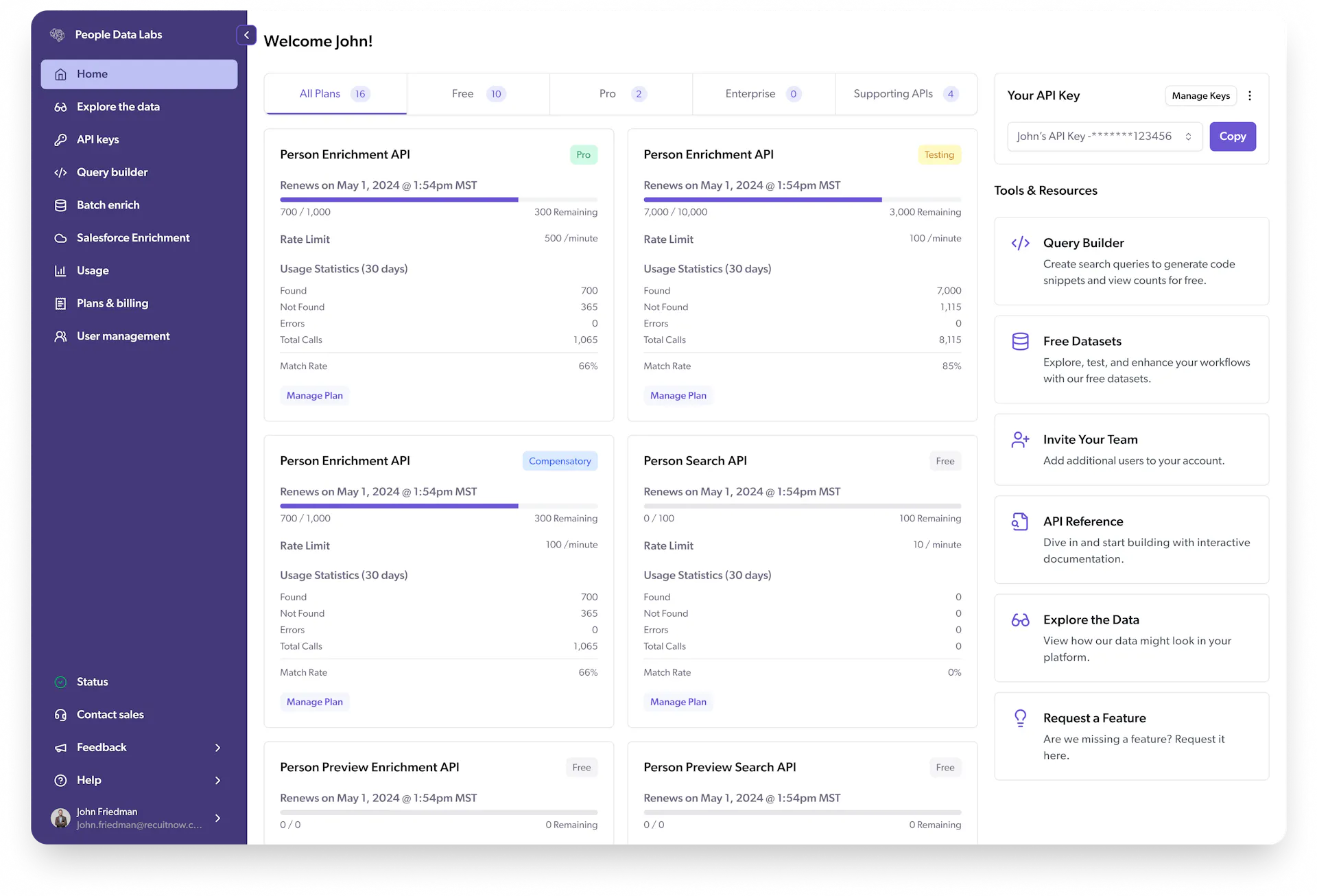
What it is: An API-first data enrichment platform designed for developers and enterprises. Specializes in turning identifiers (like emails) into rich person profiles at scale.
Coverage & sources:
- 3.1B+ people profiles worldwide.
- Data from public web sources, resumes, social networks, and professional directories.
- Updated regularly, but not fully “real-time.”
Core capabilities:
- Person Enrichment API: Input an email → returns attributes such as full name, age, gender, location, job title, company, industry, education, skills, and social profile URLs.
- Bulk enrichment: Supports large-scale batch queries for tens or hundreds of thousands of records.
- Developer-friendly: Fast performance, strong documentation, easy CRM/data warehouse integration.
- Advanced search: Person Search API allows targeted queries (by name + company, skills, etc.).
Strengths:
- Massive scale: Billions of structured profiles, often fresher than static databases.
- Integration-first: Built for embedding into workflows, CRMs, and apps.
- Broad coverage: Global dataset with strong professional focus.
- Supportive ecosystem: Good documentation, customer support, and batch-processing capabilities.
Primary use cases:
- Sales & marketing: Enrich leads with professional and social data for outreach.
- Customer intelligence: Turn raw email lists into detailed profiles.
- Identity verification: Check consistency between user-provided info and enrichment data.
- Platform integration: Power signups, auto-fill features, or background checks in SaaS and fintech apps.
Limitations to note:
- Not live OSINT: Data refreshed regularly but not instantly updated.
- Compliance considerations: GDPR/CCPA requires careful handling of enriched data.
- Less consumer-facing: Primarily an API, not a user-friendly UI like Spokeo or BeenVerified.
Best fit: Enterprises and platforms that need scalable, developer-ready enrichment for identity resolution, sales intelligence, or product integration. PDL is less about ad-hoc lookups and more about building data-driven systems at scale.
9. Hunter.io – Email Finder & Verifier for Professionals
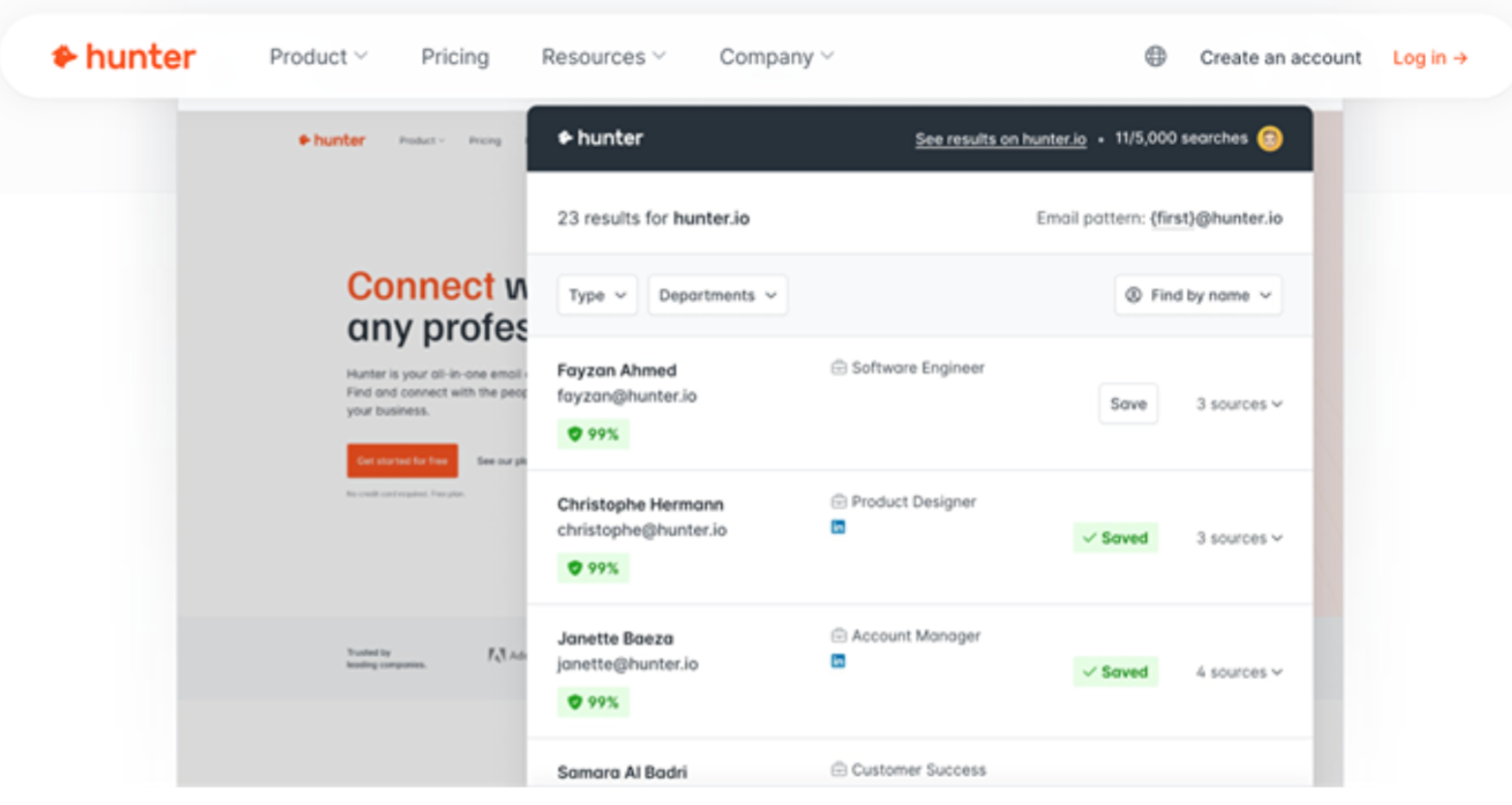
What it is: A well-known email finding and verification tool for sales, marketing, and recruiting. Best for professional/corporate email addresses.
Coverage & sources:
- 100M+ indexed emails from publicly available web pages (company sites, press releases, directories).
- Focuses primarily on business domain emails, not personal ones (Gmail, Yahoo, etc.).
Core capabilities:
- Reverse email lookup: Identifies name, role, and source web page for a given email.
- Email verification: Checks if an email is deliverable via server pings.
- Domain search: Lists all company emails found for a given domain (with names/roles).
- Bulk tools: Supports batch email lookup and verification.
- Integrations: Chrome extension, Google Sheets add-on, API.
Strengths:
- Speed & simplicity: Results returned instantly; highly user-friendly.
- Professional focus: Strongest for work/corporate addresses.
- Generous free tier: 50 free searches/verifications per month.
- Workflow integration: Easily plugs into sales/CRM systems.
Primary use cases:
- Sales & marketing: Finding and validating leads’ emails.
- Recruiting: Confirming candidate emails and roles.
- Email hygiene: Cleaning mailing lists to avoid bounces.
- Quick B2B identity checks: Verifying that a corporate email matches the claimed person/company.
Limitations to note:
- Not consumer-oriented: Weak on personal webmail addresses (Gmail, Yahoo, Outlook).
- No social footprint: Doesn’t provide social media profiles or personal details.
- Business-only angle: Best suited for B2B contexts, not investigations.
Best fit: A lightweight, professional identity tool for sales, marketing, and recruitment teams. Ideal for quickly confirming the validity and ownership of corporate emails, but less useful for personal or deep investigative searches.
10. Enrich.so Free Reverse Email Lookup — Professional Profile Extraction
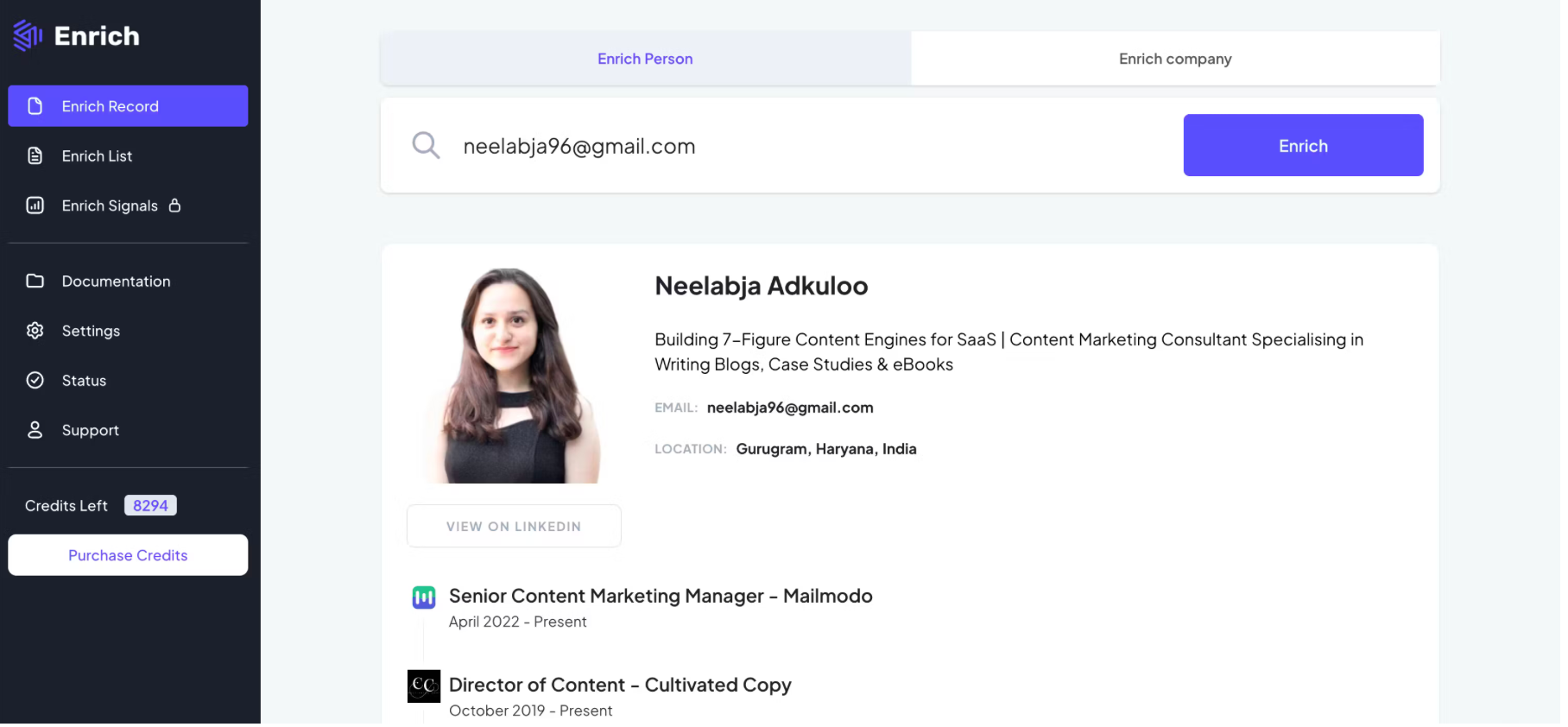
What it is: A free, consumer-accessible reverse email lookup tool focused on extracting professional profile data for B2B contextual use. Available directly via the Enrich.so platform.
Coverage & sources:
- Pulls from public professional profiles, including work history, education, skills, certifications, and volunteer background.
- Tailored for business email addresses — emphasizes career-related insights.
Core capabilities:
- Reverse email lookup: Provides professional background info—job history, skills, certifications, and volunteer experience.
- No sign-up required—instant access to results for occasional lookups.
- Offers a more advanced API suite for bulk enrichment, real‑time updates, and targeted search functionality.
Strengths:
- Fast and easy: Generates professional insights in real time, with minimal friction.
- Detailed career data: Enriches basic emails with employment history and qualifications.
- Freemium with scalability: Free for single lookups, with API options for enterprise workflow integration.
Primary use cases:
- Sales & marketing enrichment: Build richer lead profiles beyond email addresses.
- Recruiting & verification: Quickly surface candidate employment history tied to an email.
- CRMs & product workflows: Deliver real-t ime profile enrichment for onboarding or segmentation.
- Ad-hoc professional checks: Verify email identities behind business addresses during outreach.
Limitations to note:
- Professional scope only: Centered on career data—does not provide personal, social, or risk-related info.
- Uneven depth: Free version provides limited detail; full capabilities require API integration.
- Privacy limitations: Focused only on public profile data—does not guarantee comprehensive coverage.
Best fit: Organizations or professionals looking for quick, professional-level enrichment from business emails—whether for occasional lookups or scaling insights programmatically via API.
Conclusion
Reverse email lookup has grown into a powerful toolset, with each service serving a different niche: Pipl and People Data Labs for large-scale enrichment, BeenVerified and PeopleFinders for U.S. public records, Social Catfish for OSINT and social trails, Hunter.io for B2B sales, and Spokeo for quick consumer checks.
For companies, the real advantage comes from solutions that combine broad data coverage with real-time risk insights. This is where Scoreplex stands out—offering not just identity data, but also trust signals, technical email checks, and hidden connections, all in one place. It’s purpose-built for businesses handling onboarding, compliance, or high-value transactions, turning a simple email into a full, actionable digital identity profile.
If you want to see how this works in practice, explore the resources on the Scoreplex blog—or better yet, book a personalized demo to witness how Scoreplex can help your organization cut fraud, streamline onboarding, and make smarter customer decisions.
